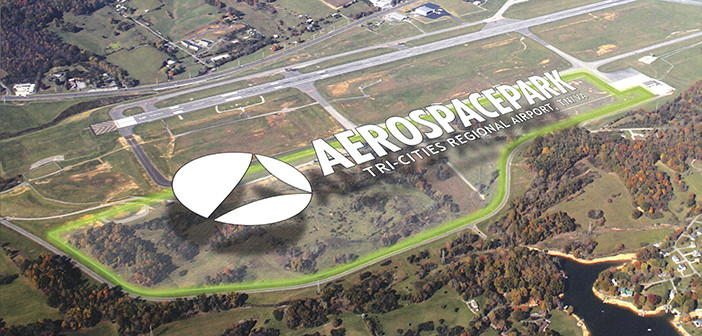By Gary Gray
A legislative template is now in place to finance the Tri-Cities Airport’s 160-acre Aerospace Park, and five local governments interested in a return on their investments are now budgeting funding for Northeast Tennessee’s next burgeoning industry.
Both houses of the General Assembly unanimously approved the move, which clears the way for unprecedented aviation-related economic development in the region. The new law allows the Tri-Cities Airport Authority to borrow money and issue revenue bonds. It also grants Washington and Sullivan counties, as well as Johnson City, Bristol and Kingsport the legal wherewithal to guarantee the principal and interest on the bonds are paid in full.
“The park is probably the best economic opportunity the region has seen in a long time,” said Johnson City’s City Manager Pete Peterson. “There is a potential to create from 1,500 to 2,000 new, high-paying jobs, and it could augment the existing aerospace industry that’s already here.
“While there has been talk of regional cooperation throughout the years, this project will demonstrate what can be done when five local governments work together. The respective county and cities will be building funding into the next fiscal year’s budgets.”
Patrick Wilson, the airport’s executive director, has said he wants to begin the project with $20 million to pay for site development at the Aerospace Park on the south side of the airfield. While 160 acres are available, only 21 acres have been certified so far by the state’s Select Tennessee Sites program.
Wilson said the main goal is to attract aircraft-related maintenance, repair and overhaul companies, and there have been more than a dozen prospective projects tucked away awaiting legislative clearance.
Industry segments include the manufacturing of engines, airframes, electronics, interior components and accessories. Delivery and training centers also offer opportunities in the maintenance and repair of those components.
The Airport Authority is seeking money from a number of sources grants, including the Tennessee Valley Authority and Federal Aviation Administration; allocations from the named local governments, as well as state funding.
Other potential grant funding could come from the site development grants from the state’s Rural Economic Development Fund, U.S. Department of Commerce infrastructure improvement grants and the Appalachian Regional Commission.
Washington County Mayor Dan Eldridge said the regional commitment and cooperation was clearly a motivating factor for the area’s legislative delegation in getting the enabling legislation introduced and adopted as quickly as it was.
“I am very pleased to see the enabling legislation approved in Nashville,” Eldridge said. “This is the best opportunity we’ve had, at least since I’ve been in office, to work together as a region toward a mutually beneficial economic development objective.
“There is still work to be done to convince the General Assembly of the need to invest state funds in the project. However, I’m not aware of another request from across the state that pledges a dollar for dollar match by the local communities. That, plus the potential return on investment in the form of high paying aerospace jobs, is a compelling argument in favor of investing state funds.”
What makes these jobs desirable is that aircraft and avionics equipment mechanics and technicians have an average annual salary of about $58,400, while aerospace engineers make about $108,000 a year.
Meanwhile, median general manufacturing jobs in the Tri-Cities pay about $34,000 per year, according to the U.S. Bureau of Labor Statistics and Tennessee Department of Labor and Workforce Development.
Wilson said in September filling the park was “more than a wish.” Several companies had expressed interest last year, and if a larger space had been ready it would have been much easier to meet their needs immediately, rather than at some point in the future, he said.
The Tri-Cities Airport Authority, Tennessee Valley Authority, Tennessee’s Economic and Community Development Department and NETWORKS — Sullivan Partnership are the primary marketers wanting to grow aerospace manufacturing and engineering at the site.
“We at the airport have been doing a significant amount of partnering with local groups,” Wilson said. “We’re doing a lot of promotion, but we’re all working together on it.”
In the past 15 years, more than $23 million has been invested in infrastructure at the airport and for the park. The 2014 Hamilton Road relocation and taxiway extension accounts for more than $10 million.
Johnson City Mayor David Tomita said getting the adjacent 140 acres ready for development would take two years. He also described the terrain at the property as “tough to cut,” meaning it is very steep and hilly.
“The Aerospace Park project is, without a doubt, the most important project in Northeast Tennessee,” Tomita said. “Not only from an economic standpoint, but also in terms of regional commitment.”
The park has an existing taxiway system and ramp that provides direct airfield access. A 5-acre-concrete aircraft apron can accommodate large aircraft, and an access road connects the site to a major public roadway system.
A stormwater detention system is in place to accommodate future development. Bristol Tennessee Essential Services would provide electric service, and Atmos Energy has gas lines run to the park.
Johnson City would provide water and wastewater services, with a current capacity to move 6 million gallons per day.
Telecommunications offerings are available from CenturyLink, Charter and BTES. A fiber optic system already serves the airport, and high-speed cable internet services would be available at the industrial site.
“Right now we have the primary marketers in place, but there are a lot of other entities that can develop leads and work with potential tenants and employers, such as the Washington County Economic Development Council,” Tomita said. “I think this is something that’s very doable.”




